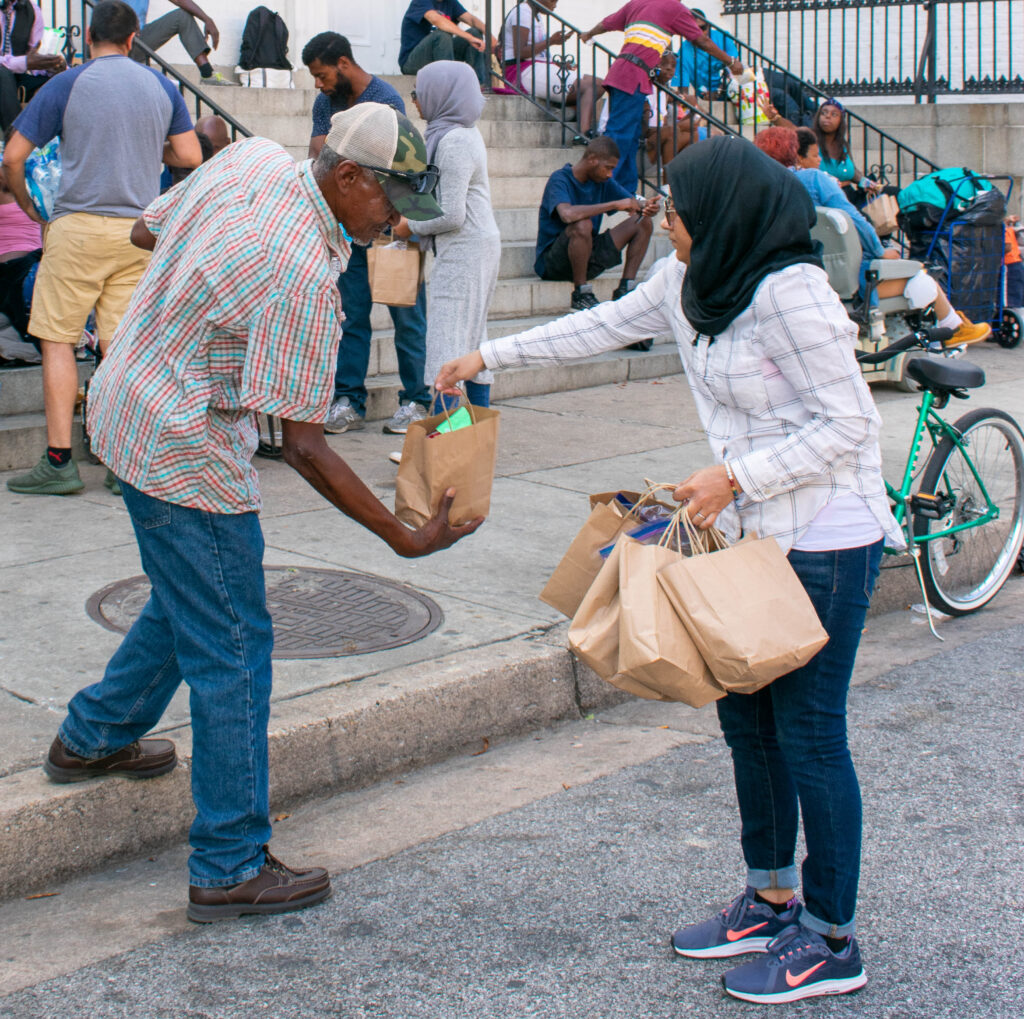Muslim need to realize once again that volunteering is an aspect of charity

By Huda Helal
November/December
Muslim immigrants in the West, especially in North America, have done an incredible job of integrating into the mainstream. Unlike their non-immigrant counterparts, some of them have fast-tracked their way over the course of just two or three generations into such respectable professions as medicine, law and engineering. They have also shown their willingness to embrace modernity.
Unfortunately, they traded a pervasively Islamic society for one that is philosophically at odds with Islamic principles. As a result, they separated their spiritual and worldly selves and made their worship a private transaction between themselves and the Creator. This self-made bubble has blinded them to modernity’s immense spiritual and psychological toll — rising levels of anxiety, depression, despair and other mental illnesses.
Muslims who wish to succeed as Muslims in the midst of modernity must reconfigure their understanding of worship. But how does one encourage them to think of Islam as a transformative rather than a transactional force? One way would be to understand that the pillars of Islam are less of an end goal unto themselves and more of a means to attain goals like humility, selflessness and God’s pleasure.
Volunteering, an essential but oft-forgotten aspect of charity, has become restricted to donating money to the mosque or an online Muslim charity. However, this noble endeavor has taken on a mechanical, almost sanitized, transactional nature that fosters no connection with fellow humans or society. Thus, how can one understand the hadith that all Muslims are like one body (“Sahih al-Bukhari,” 6011)?
The Prophet (salla Allahu ‘alayhi wa sallam) encouraged Abu Dharr (‘alayhi rahmat) to love and live with the poor (“Musnad Ahmad,” vol. 5, pg. 159). When we spend time with the socially disadvantaged, we learn about their stories and sorrows, their happiness and hopes. In short, we humanize them and understand that “There, but for the grace of God, go I.”
Muslim high school and college students often volunteer, fueled by their desire to encourage good and forbid evil, at their local shelters or with Muslim charities. Unfortunately, full-time jobs, marriage and families often limit such activities to weekend Islamic schools or mosque activities. Muslims need to reignite and extend their youthful passion to other opportunities by serving humanity and, ultimately, connecting with and conveying the prophetic example to our youth. Remember that the Prophet’s Mosque also served as a soup kitchen for the Companions of the Porch (Ahl al-Suffa).
As the saying goes, charity begins at home. But it shouldn’t end there, for there are endless ways to follow the Prophet’s (salla Allahu ‘alayhi wa sallam) and his Companions’ example. Anas ibn Malik (‘alayhi rahmat) narrated that the Prophet said, “Good deeds done for people protect those who did them from evil fates, harm and destruction. The people of goodness in the world are the people of goodness in the Hereafter” (“Shu’ab al-Iman,” 7704).
Listed below are some lesser-known organizations that tackle unique issues.
• Muhsen provides resources for differently abled people. It seeks to “establish an inclusive and accessible environment for individuals with disabilities and their families … advocate and educate, conduct training, and implement programs and services across North America to improve the experience within mosques, conventions, related classes and events, as well as to engender a positive and welcoming community for persons with disabilities….” Its staff has made large inroads in initiating conversations and acknowledging the challenges faced by this formerly ignored community.
• IMAN, founded 25 years ago, advocates for and offers resources to Chicago’s economically disadvantaged inner-city population. “The Inner-City Muslim Action Network (IMAN) is a community organization that fosters health, wellness and healing in the inner-city by organizing for social change, cultivating the arts, and operating a holistic health center….” Among other services, it operates food banks and advocates for local businesses and reforming legislation that targets people of color. In 2016, a chapter was opened in Atlanta’s West End neighborhood.
• Islah LA serves the Los Angeles community by offering a platform on which inner-city Muslims can address their growing needs. It also seeks to “renew faith, education, unity, family, civic engagement, and economic empowerment in South Los Angeles.”
• Nisa Helpline and Wafa House focus on women’s concerns, including domestic abuse. Canada-based Nisa Helpline offers “peer-to-peer counseling, support in creating action plans, referrals, emotional and spiritual support and encouragement to women … well-being of Muslim women in North America and empowers them with the tools necessary to lead self-sufficient and dignified lives….”
New Jersey-based Wafa House “caters to the needs of the Middle Eastern and South Asian (survivors) … reunit(es) children with their biological parents after displacement or removal from their homes … counseling services and teach(ing) active parenting skills…” and much more. The North American community needs many more such organizations to address the needs of Muslims who need mental health support and have survived domestic violence.
• Ojala Foundation supports Illinois’ Latino Muslims via clothing and food drives and offers “spaces where our brothers and sisters can congregate and feel a sense of belonging … yearly Eid celebrations for the entire family … iftar … da‘wah…”
• Tayba Foundation serves “all people affected by incarceration, does not discriminate on the basis of race, color, religion or national and ethnic origin in administration of its educational and admission policies…”
• Ek Plate Biryani comprises a Canadian group of volunteers. Literally meaning “One Plate of Biryani,” it highlights the importance of small consistent change. They moved from “cooked meals to food rations and school lunches, and then on towards lasting clean water solutions and sustainable income projects…”
• Paani Project, founded by a few University of Michigan students, tackles Pakistan’s water crisis by building wells, and supplying medical supply kits and hope. It members are also active in other water-scarce countries.
• Islamic Social Services of South Jersey advocates for women to “create sustainable change for themselves, their families, and communities.” Participants team up with local sister organizations and during emergency situations like the recent floods in Pakistan.
• Community SJP’s dedicated volunteers arrange food drives, care packages and other initiatives for the South Jersey–Philadelphia area.
• Care and Share Foundation provides meals, care packages, funeral services and other services.
We have seen what is possible through the three Ds of du‘a, drive and determination. The ideas listed below highlight how we can incorporate the Prophetic examples in our communities:
• Hobby clubs for Muslim and non-Muslim youth. Hiking, arts and crafts, reading and other hobbies can be used to encourage one’s understanding of fitra and our relationship with the Divine. After all, children are souls before their bodies and thus finely attuned to their fitra.
• Volunteering at hospitals and/or nursing homes. Imam al-Qurtubi (‘alayhi rahmat; d. 1273) mentions that visiting the sick and the dying softens the heart (“At-Tadhkirah: Reminder of the Conditions of the Dead and the Matters of the Heart”, Hikmah Publications). We don’t know how showing such compassion in their time of greatest need might affect them or testify for us on the Day of Judgement (“Sahih Muslim,” 2568).
• Outreach programs to integrate converts. Converts are often left to fend for themselves after losing the support of their former communities and being forgotten by Muslim groups. Our greatest strengths are our unity and the ties of Islam. What better event is there than to welcome our new brothers and sisters in faith?
• Fostering relationships between inner-city and resource-rich suburban Muslim communities. We must address the elephant in the room: Economically successful immigrant communities have traditionally ignored the socially disadvantaged African American and Latino Muslims.
• Clubs that mentor Muslim youth in academic and social subjects. As our youth face ideologies that are increasingly at odds with our principles, we should offer them a wholistic support system that anticipates and addresses their needs.
• Clubs that help integrate new immigrants. We can provide them with networking opportunities and mentorship, just as the Muhajireen did for the Ansar.
The Prophet said: “God does not look at your outward appearance and your goods. He looks only at your hearts and your deeds” (“Sahih Muslim,” Birr, 33).
These investments in our community and our eternity inherently come with a high price tag: Volunteers often face judgment and anger from both their community and the people they are trying to help. As disappointing as this can be, we must remind ourselves that our undertaking is with God, the Giver of all things, and not His Creation. Accepting this attribute comforts us in the knowledge that God knows what we do and what’s in our hearts, because “God is ever Appreciative, All-Knowing” (4:147).
One of the Saleheen (pious predecessors) has said, “The people of the world are truly of the poor, as they leave the world without finding the jewel therein: the knowledge of God.” This knowledge is the emptiness we feel in our hearts, that yearning for something deeper even when we have “everything.” May God make us one of those who seek His pleasure until we meet Him.
Huda Helal is a freelance writer.
Tell us what you thought by joining our Facebook community. You can also send comments and story pitches to horizons@isna.net. Islamic Horizons does not publish unsolicited material.
